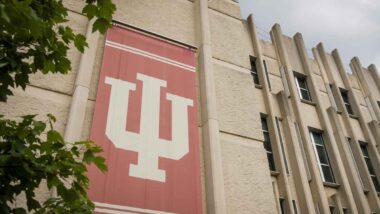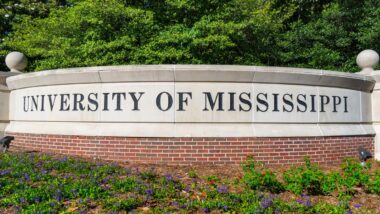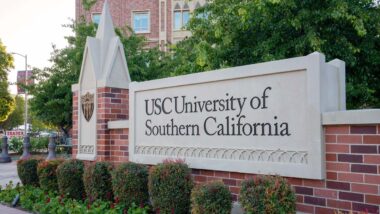
UPDATE:
- A judge dismissed this case Dec. 19, 2019.
A Grand Canyon University student has filed a class action lawsuit alleging that the private, for-profit school deceptively markets the value and nature of its professional programs by misleading its students to think it has accreditation that it does not.
Additionally, the students argue that the university further misrepresents itself to students by taking out loans for students without their knowledge or consent.
The Grand Canyon University accreditation class action lawsuit was filed by Katie Ogdon who signed up for Grand Canyon University Master of Science in Psychology with an emphasis in Health Psychology program.
Ogdon says she did this because she was told that the program was a suitable way to reach her intended career.
However, she claims to have later discovered that the school did not have the appropriate accreditation to allow her to qualify for licensure as a mental health therapist in California, as she had intended.
Allegedly, the school uses “advisors” who market unaccredited professional programs to students. Ogdon states that these advisors recommend that students take classes that will not allow them to quality for licensure.
According to Ogdon, the school enrolls thousands of students per year in unaccredited programs. She notes that primarily, these students aim to pursue careers in the healthcare and educational fields.
The Grand Canyon University accreditation class action lawsuit states that Ogdon and many other students are financially injured by this practice, because they are effectively tricked into paying for education that is useless.
She states that no student would knowingly enroll in a professional degree program only to obtain a degree that is not accepted.
The plaintiff further stresses that this scheme prohibits students from transferring their coursework to an other institution — one with an accredited program — because an accredited program will not accept Grand Canyon University course credits.
The Grand Canyon University accreditation class action lawsuit states that GCU systematically puts profits ahead of its students best interest.
She notes that the school is a for-profit university, but argues that the school tricks students into thinking it is non-profit because of how GCE, Grand Canyon’s educational services business, was strategically distanced from the school.

Ogdon explains that the school hires low-quality professors and pays them a low wage, often on a part-time basis.
She asserts that the school spends only 15 percent of its revenue on faculty salaries, whereas most four-year accredited universities spend around 70 percent of revenue on faculty salaries.
The school is allegedly lacking in training and support for these underpaid professors and doles out substandard educational materials to students.
Allegedly, these elements make the program profitable for the school, but prevent it from meeting the standards necessary for accreditation.
The Grand Canyon University tuition class action lawsuit then goes on to say that the school intentionally keeps students in the dark about the nature of their education in other ways. The also school perpetuates this scheme through information misleadingly presented by the school “advisors.”
Additionally, Ogden says that the school is mostly funded by the tuition of students gained through student loan programs.
She argues that this means that the federal government is “wasting hundreds of millions of dollars each year of unaccredited degree programs which do not advance students or their professional careers.”
Ogdon notes that many students at Grand Canyon are online students, explaining that the school gains a significant portion of its revenue from these students.
School representatives are reportedly told to recruit students by glossing over the school’s method for procuring student loans to pay for a Grand Canyon University tuition. Specifically, Ogden says that the representatives do not explain that the school takes out loans on their behalf, nor do they tell them the amount of the loans.
Allegedly, the school relies on the fact that that most student loan payments are not due until after a student has graduated, so many students at Grand Canyon University complete their studies before they realize that they are in thousands of dollars in debt without their previous knowledge.
These allegations are not the first launched against Grand Canyon University over misleading marketing tactics.
If you pursued higher education, how did you choose your educational institution? Share your experiences in the comments below.
Ogdon is represented by Annick Persinger, Hassan A. Zavareei, and Kristen G. Simplicio of Tycko & Zavareei LLP.
The Grand Canyon University Accreditation Class Action Lawsuit is Katie Ogdon v. Grand Canyon University Inc., et al., Case No. 1:20-at-00363, in the U.S. District Court for the Eastern District of California.
ATTORNEY ADVERTISING
Top Class Actions is a Proud Member of the American Bar Association
LEGAL INFORMATION IS NOT LEGAL ADVICE
Top Class Actions Legal Statement
©2008 – 2026 Top Class Actions® LLC
Various Trademarks held by their respective owners
This website is not intended for viewing or usage by European Union citizens.















62 thoughts onGrand Canyon University Class Action Alleges Accreditation Scam
I feel I am a victim of this scam as well I enrolled in 2021 as well to study to be a phycologist and i was in a situation with the online school and in the time frame of the beginning of my studies I became very ill and sent them proof of the illness and they attached the onto my credit score and I feel they wrongfully charged me in this matter and I tried everything in my power to fight this with them to get the charges removed and they treated me horribly and I was very devastated with their actions especially being a Christian school, I honestly gave up until I came across this scam lawsuit. If anyone may have any information for me or even numbers I can contact for help on this very stressful situation thanks.